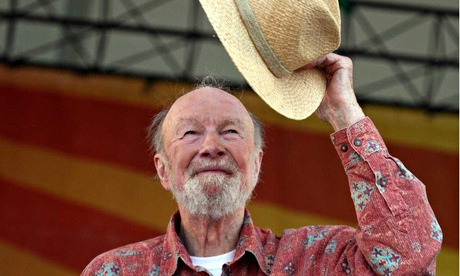Pete Seeger was a great American and one of the most pivotal and positive voices in American music from his birth in Manhattan in 1917 to his passing last January 94 years later. He was one of the most influential musicians of the 1960s folk movement because he had been there, in Greenwich Village, 20 years before, bringing to traditional music of America's farmers, workers, sailors, cowboys, hobos, African-Americans, and hosts of other forgotten groups to the masses for the first time. His career was one of principles and powerful songs. He fought for social justice. He fought for environmental justice. And while he was an optimist who believed in the power of songs and togetherness to change the world, his will and determination were as hard as steel.
As World War II was beginning, Seeger was in Greenwich Village with fellow musicians Millard Lampell, Woody Guthrie, and Lee Hayes. They formed a loose collection of folk singers, calling themselves the Almanac Singers, and were dedicated to playing political and topical folk songs. The songs were rallying cries for labor unions and for civil rights. Most members of the group that came and went were members of the communist party and full supporters of labor activism in the US. They lived together at various locations downtown and in Greenwich Village during WWII, each christened 'Almanac House.' They would hold jam sessions that they called hootenannies and charge 35 cents admission to cover the rent. One of these houses is the still intact townhouse at 10 West 10th Street in Greenwich Village, squished next to a firehouse. The hootenannies weren't enough to pay the rent and the Almanacs were evicted a year later, but the movement had started.
During the Almanac days, the most political and successful of their recordings was the album "Talking Union," made up of six songs for the picket lines. The title song was the most popular at rallies, in particular Seeger's closing lines that the workers "take it easy -- but take it." They played it to raucous applause at a rally for 20,000 striking transit workers at Madison Square Garden in 1941. The song hasn't really aged well, but these songs would form the bedrock for Seeger's later hits.
Seeger would later form up a chart topping group, The Weavers, in the 1950s. Their biggest hit was "Goodnight, Irene," long a staple of Almanac hootenannies. But Seeger's communist past would catch up to him in the 50s during the red scare. He was one of many entertainers called in front of Congress and the House Un-American Activities committee. Some who were called to testify named names. Others took the 5th and refused to talk. But no one else testified as Seeger did. He refused to answer any question about who he sang for and where he sang. He also refused to take the 5th Amendment believing he had done nothing wrong and therefore had no need to plead the 5th. He was held in contempt of Congress and in 1961 convicted and sentenced to 12 months in prison. Thankfully his conviction was overturned before having to serve any time. But for a decade after his testimony he would be blacklisted and be unable to perform on TV.
That might have suited Seeger just fine, who had always identified more as a travelling troubador instead of a polished pop star. He played at summer camps, schools, colleges, and at clubs in Greenwich Village, where he was a mentor for the new 1960s wave of folk musicians like Bob Dylan and Peter, Paul, and Mary.
As the 60s progressed, Seeger became intimately tied to the civil rights movement and to the environmental movement. He introduced the old spiritual "We Shall Overcome" to organizers in the civil rights movement and it became the anthem of an era. He started the Sloop Clearwater organization in 1966 to fight the continuing pollution of the Hudson River and Sloop Clearwater continues to be the most prominent grassroots environmental group in the Hudson Valley, with their namesake vessel constantly plying the river to raise awareness. He was also on the founding board of the Newport Folk Festival in 1959, which also continues past his death an one of the marquee folk concerts in America.
To the end, Seeger never stopped believing in the power of people and music. He performed "This land is your land" at President Obama's first innaugural, he wrote songs decrying fracking in New York State, and he marched in solidarity with Occupy Wall Street. Pete Seeger was a man who sang the songs of the downtrodden and forgotten, taught the beauty of music to children of all backgrounds, kept alive the culture and history of America, and never stopped fighting for a better world in 94 full years. May he rest in peace.




No comments:
Post a Comment